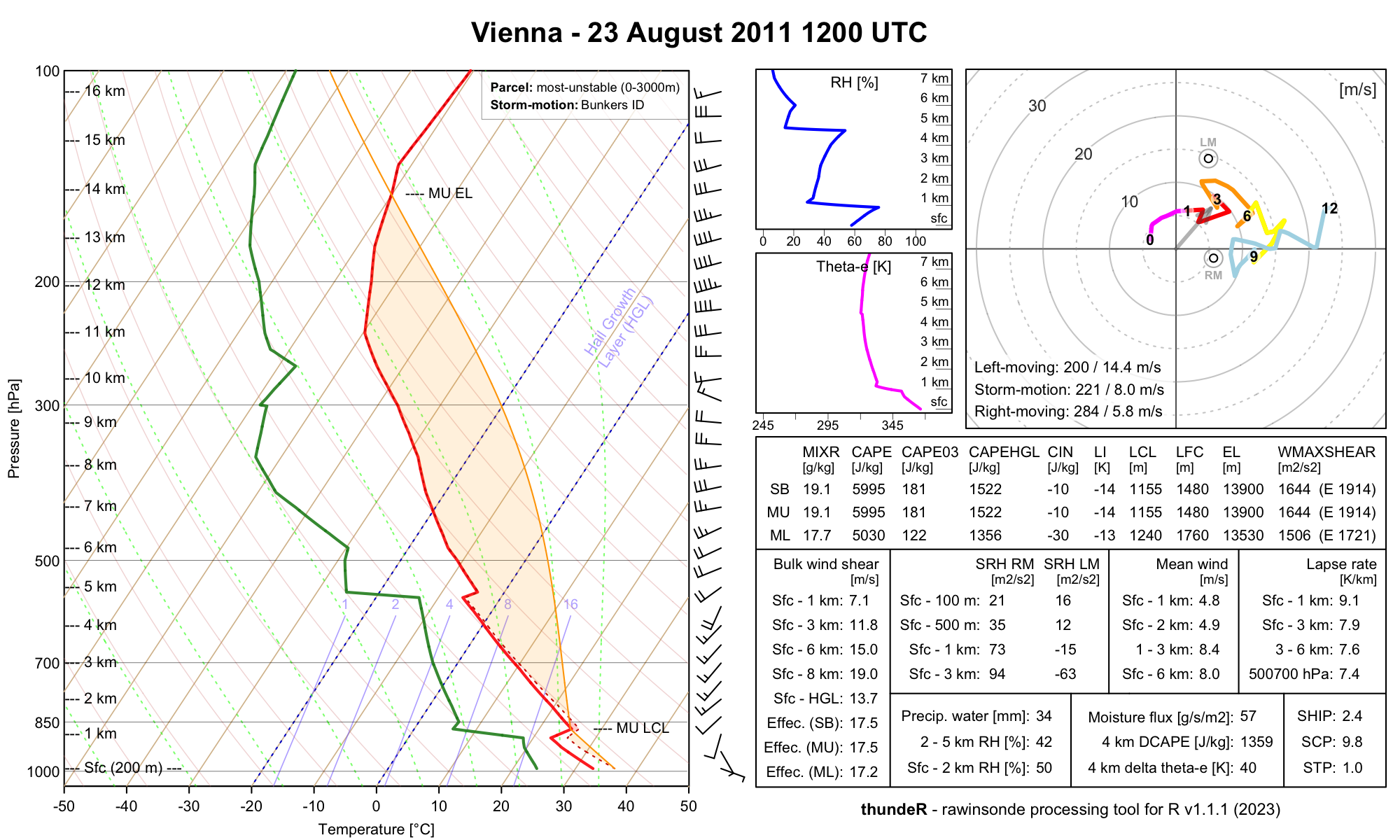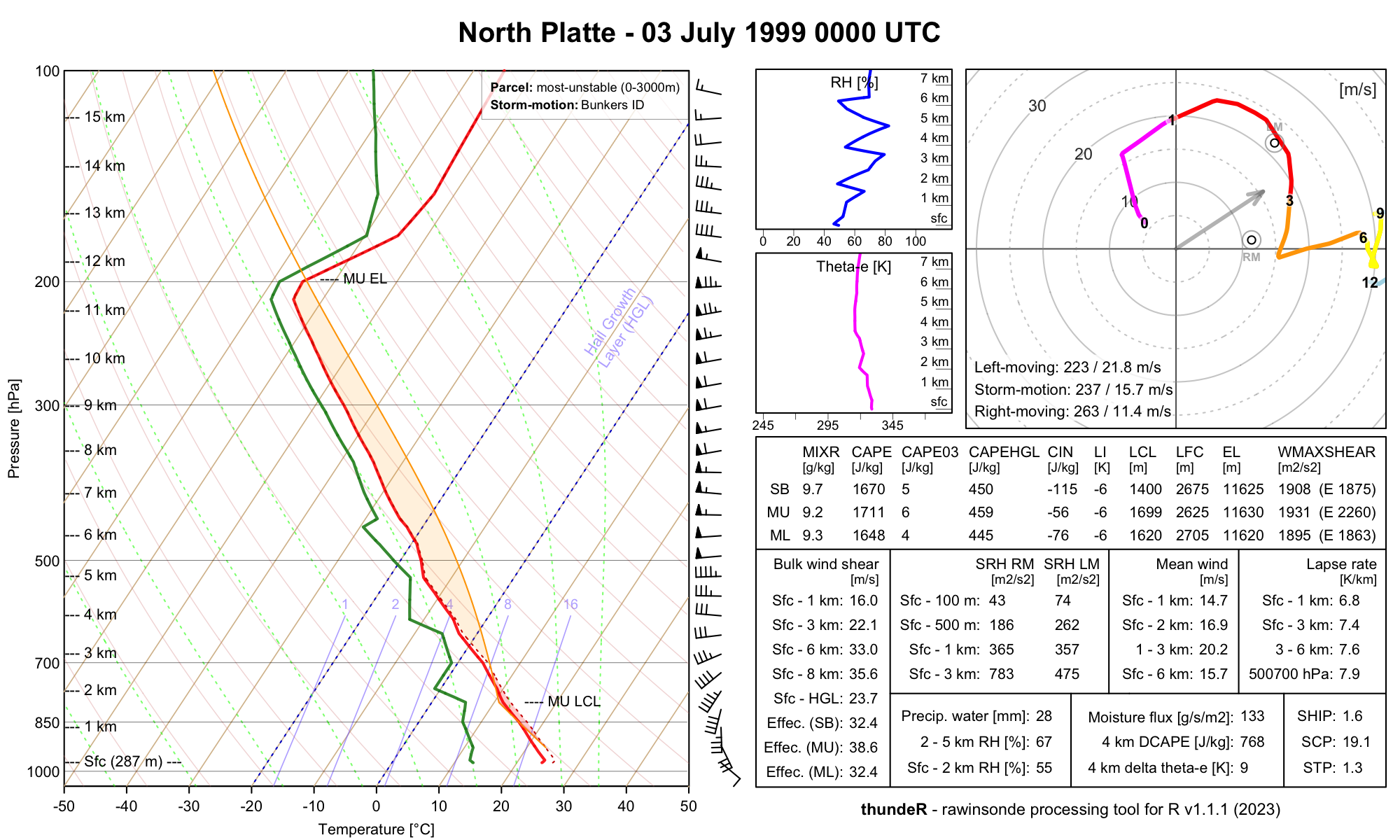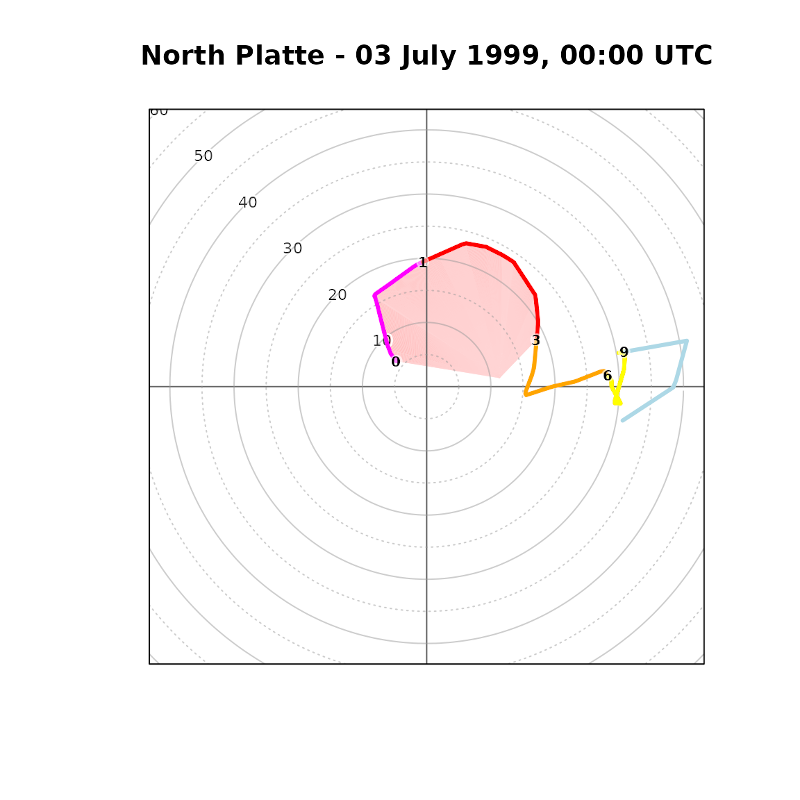Awesome
thundeR <img src="https://github.com/bczernecki/thundeR/raw/master/man/figures/logo.png" style="float:right" width="150"/>
Rapid computation and visualisation of convective parameters from rawinsonde and numerical weather prediction data
<!-- badges: start --> <!-- badges: end -->thundeR is a freeware R package for
rapid computation and visualisation of convective parameters commonly
used in the operational forecasting of severe convective storms. Core
algorithm is based on C++ code implemented into R language via Rcpp.
This solution allows to compute over 200 thermodynamic and kinematic
parameters in less than 0.02s per profile and process large datasets
such as reanalyses or operational NWP models in a reasonable amount of
time. Package has been developed since 2017 by research meteorologists
specializing in severe convective storms and is constantly updated with
new features.
Online browser
Online rawinsonde browser of thundeR package is available at http://rawinsonde.com
Installation
The stable version can be installed from the CRAN repository:
install.packages("thunder")
The development version can be installed directly from the github repository:
remotes::install_github("bczernecki/thunder")
Usage
Draw Skew-T, hodograph and convective parameters on a single layout and export to png file
data("sounding_vienna") # load example dataset (Vienna rawinsonde profile for 23 Aug 2011 12UTC):
pressure = sounding_vienna$pressure # vector of pressure [hPa]
altitude = sounding_vienna$altitude # vector of altitude [meters]
temp = sounding_vienna$temp # vector of temperature [degree Celsius]
dpt = sounding_vienna$dpt # vector of dew point temperature [degree Celsius]
wd = sounding_vienna$wd # vector of wind direction [azimuth in degrees]
ws = sounding_vienna$ws # vector of wind speed [knots]
sounding_save(filename = "Vienna.png", title = "Vienna - 23 August 2011 1200 UTC", pressure, altitude, temp, dpt, wd, ws)

Download LBF North Platte rawinsonde profile for 03 Jul 1999 00UTC and export to png file
profile = get_sounding(wmo_id = 72562, yy = 1999, mm = 7, dd = 3, hh = 0)
sounding_save(filename = "NorthPlatte.png", title = "North Platte - 03 July 1999 0000 UTC", profile$pressure, profile$altitude, profile$temp, profile$dpt, profile$wd, profile$ws)

Compute convective parameters based on a sample vertical profile data:
library("thunder")
pressure = c(1000, 855, 700, 500, 300, 100, 10) # pressure [hPa]
altitude = c(0, 1500, 2500, 6000, 8500, 12000, 25000) # altitude [meters]
temp = c(25, 10, 0, -15, -30, -50, -92) # temperature [degree Celsius]
dpt = c(20, 5, -5, -30, -55, -80, -99) # dew point temperature [degree Celsius]
wd = c(0, 90, 135, 180, 270, 350, 0) # wind direction [azimuth in degress]
ws = c(5, 10, 20, 30, 40, 5, 0) # wind speed [knots]
accuracy = 2 # accuracy of computations where 3 = high (slow), 2 = medium (recommended), 1 = low (fast)
sounding_compute(pressure, altitude, temp, dpt, wd, ws, accuracy)
# MU_CAPE MU_CAPE_M10 MU_CAPE_M10_PT MU_02km_CAPE
# 2269.9257 998.1443 313.0747 247.9794
# MU_03km_CAPE MU_HGL_CAPE MU_CIN MU_LCL_HGT
# 575.6293 1616.5384 0.0000 730.0000
# MU_LFC_HGT MU_EL_HGT MU_LI MU_LI_M10
# 730.0000 8300.0000 -10.1119 -10.8539
# MU_WMAX MU_EL_TEMP MU_LCL_TEMP MU_LFC_TEMP
# 67.3784 -28.8000 17.7000 17.7000
# MU_MIXR MU_CAPE_500 MU_CAPE_500_M10 MU_CAPE_500_M10_PT
# 14.8759 1076.0322 389.3651 137.0814
# MU_CIN_500 MU_LI_500 MU_LI_500_M10 SB_CAPE
# 0.0000 -5.0417 -6.2346 2269.9257
# SB_CAPE_M10 SB_CAPE_M10_PT SB_02km_CAPE SB_03km_CAPE
# 998.1443 313.0747 247.9794 575.6293
# SB_HGL_CAPE SB_CIN SB_LCL_HGT SB_LFC_HGT
# 1616.5384 0.0000 730.0000 730.0000
# SB_EL_HGT SB_LI SB_LI_M10 SB_WMAX
# 8300.0000 -10.1119 -10.8539 67.3784
# SB_EL_TEMP SB_LCL_TEMP SB_LFC_TEMP SB_MIXR
# -28.8000 17.7000 17.7000 14.8759
# ML_CAPE ML_CAPE_M10 ML_CAPE_M10_PT ML_02km_CAPE
# 1646.0639 670.1001 225.2816 164.0798
# ML_03km_CAPE ML_HGL_CAPE ML_CIN ML_LCL_HGT
# 422.4290 1250.0221 0.0000 975.0000
# ML_LFC_HGT ML_EL_HGT ML_LI ML_LI_M10
# 975.0000 7900.0000 -7.6203 -8.5845
# ML_WMAX ML_EL_TEMP ML_LCL_TEMP ML_LFC_TEMP
# 57.3771 -26.4000 15.2500 15.2500
# ML_MIXR LR_0500m LR_01km LR_02km
# 13.0487 -10.0000 -10.0000 -10.0000
# LR_03km LR_04km LR_06km LR_16km
# -9.0476 -7.8571 -6.6667 -6.0000
# LR_26km LR_24km LR_36km LR_26km_MAX
# -5.0000 -5.7672 -4.2857 -5.7143
# LR_500700hPa LR_500800hPa LR_600800hPa FRZG_HGT
# -4.2857 -5.1807 -5.8333 2500.0000
# FRZG_wetbulb_HGT HGT_max_thetae_03km HGT_min_thetae_04km Delta_thetae
# 2275.0000 0.0000 3750.0000 28.0698
# Delta_thetae_min04km Thetae_01km Thetae_02km DCAPE
# 28.8346 330.5323 323.6191 598.3100
# Cold_Pool_Strength Wind_Index PRCP_WATER Moisture_Flux_02km
# 12.6322 33.9064 27.1046 30.4255
# RH_01km RH_02km RH_14km RH_25km
# 0.7291 0.7197 0.6452 0.5550
# RH_36km RH_HGL BS_0500m BS_01km
# 0.4436 0.4603 1.9172 3.8344
# BS_02km BS_03km BS_06km BS_08km
# 8.7821 12.6560 18.0055 17.4077
# BS_36km BS_26km BS_16km BS_18km
# 9.3693 13.3304 16.6478 20.2791
# BS_EFF_MU BS_EFF_SB BS_EFF_ML BS_SFC_to_M10
# 14.2232 14.2232 13.8968 15.5104
# BS_1km_to_M10 BS_2km_to_M10 BS_MU_LFC_to_M10 BS_SB_LFC_to_M10
# 13.6499 9.8830 14.0737 14.0737
# BS_ML_LFC_to_M10 BS_MW02_to_SM BS_MW02_to_RM BS_MW02_to_LM
# 13.6864 7.3040 10.1410 10.7870
# BS_HGL_to_SM BS_HGL_to_RM BS_HGL_to_LM MW_0500m
# 4.8934 7.7860 9.9885 2.3086
# MW_01km MW_02km MW_03km MW_06km
# 2.4251 3.3476 4.8003 7.8107
# MW_13km SRH_100m_RM SRH_250m_RM SRH_500m_RM
# 6.8389 4.2535 10.0537 19.7206
# SRH_1km_RM SRH_3km_RM SRH_36km_RM SRH_100m_LM
# 39.6346 152.5219 236.5901 1.5027
# SRH_250m_LM SRH_500m_LM SRH_1km_LM SRH_3km_LM
# 3.5518 6.9670 14.0023 -13.1308
# SRH_36km_LM SV_500m_RM SV_01km_RM SV_03km_RM
# -24.3790 0.0039 0.0039 0.0048
# SV_500m_LM SV_01km_LM SV_03km_LM MW_SR_500m_RM
# 0.0010 0.0011 -0.0014 10.0863
# MW_SR_01km_RM MW_SR_03km_RM MW_SR_500m_LM MW_SR_01km_LM
# 10.1501 9.5359 13.7821 12.8585
# MW_SR_03km_LM MW_SR_VM_500m_RM MW_SR_VM_01km_RM MW_SR_VM_03km_RM
# 8.4579 10.1078 10.2253 10.5358
# MW_SR_VM_500m_LM MW_SR_VM_01km_LM MW_SR_VM_03km_LM SV_FRA_500m_RM
# 13.7647 12.8371 8.8342 0.9982
# SV_FRA_01km_RM SV_FRA_03km_RM SV_FRA_500m_LM SV_FRA_01km_LM
# 0.9871 0.9560 0.2592 0.2800
# SV_FRA_03km_LM Bunkers_RM_A Bunkers_RM_M Bunkers_LM_A
# -0.2862 209.4046 7.7933 122.0585
# Bunkers_LM_M Bunkers_MW_A Bunkers_MW_M Corfidi_downwind_A
# 13.1825 151.9494 7.8107 218.6955
# Corfidi_downwind_M Corfidi_upwind_A Corfidi_upwind_M K_Index
# 14.6982 231.3283 9.1794 24.3548
# Showalter_Index TotalTotals_Index SWEAT_Index STP_fix
# 3.7501 44.3548 106.4168 0.3600
# STP_new STP_fix_LM STP_new_LM SCP_fix
# 0.2005 0.1272 0.0708 6.2338
# SCP_new SCP_fix_LM SCP_new_LM SHIP
# 4.9243 -0.5367 -0.4239 0.6287
# HSI DCP MU_WMAXSHEAR SB_WMAXSHEAR
# 1.7159 1.1507 1213.1848 1213.1848
# ML_WMAXSHEAR MU_EFF_WMAXSHEAR SB_EFF_WMAXSHEAR ML_EFF_WMAXSHEAR
# 1033.1051 958.3359 958.3359 797.3548
# EHI_500m EHI_01km EHI_03km EHI_500m_LM
# 0.2798 0.5623 2.1638 0.0988
# EHI_01km_LM EHI_03km_LM SHERBS3 SHERBE
# 0.1987 -0.1863 0.6482 0.7015
# SHERBS3_v2 SHERBE_v2 DEI DEI_eff
# 0.8642 0.9353 1.5198 1.1885
# TIP
# 2.4356
Hodograph example:
Download sounding and draw hodograph:
data("northplatte")
sounding_hodograph(ws = northplatte$ws, wd = northplatte$wd, altitude = northplatte$altitude, max_speed = 38)
title("North Platte - 03 July 1999, 00:00 UTC")

Perform sounding computations using Python with rpy2:
It is possible to launch thunder under Python via rpy2 library. Below
you can find the minimum reproducible example:
Make sure that pandas and rpy2 libraries are available for your Python environment. If not install required python packages:
pip install pandas
pip install rpy2
Launch thunder under Python with rpy2:
# load required packages
from rpy2.robjects.packages import importr
from rpy2.robjects import r,pandas2ri
import rpy2.robjects as robjects
pandas2ri.activate()
# load thunder package (make sure that it was installed in R before)
importr('thunder')
# download North Platte sounding
profile = robjects.r['get_sounding'](wmo_id = 72562, yy = 1999, mm = 7, dd = 3,hh = 0)
# compute convective parameters
parameters = robjects.r['sounding_compute'](profile['pressure'], profile['altitude'], profile['temp'], profile['dpt'], profile['wd'], profile['ws'], accuracy = 2)
# customize output and print all computed variables, e.g. most-unstable CAPE (first element) equals 9413 J/kg
print(list(map('{:.2f}'.format, parameters)))
['9413.29', '233.35', '1713.74', '0.00', '775.00', '775.00',
'15500.00', '-16.55', '137.21', '-66.63', '23.98', '23.98',
'23.36', '9413.29', '233.35', '1713.74', '0.00', '775.00',
'775.00', '15500.00', '-16.55', '137.21', '-66.63', '23.98',
'23.98', '23.36', '7805.13', '115.22', '1515.81', '-4.35',
'950.00', '950.00', '15000.00', ...]
Accuracy tables for sounding_compute()
The interpolation algorithm used in the sounding_compute() function
impacts accuracy of parameters such as CAPE or CIN and the performance
of the script. The valid options for the accuracy parameter are 1, 2
or 3:
accuracy = 1 - High performance but low accuracy. Dedicated for large dataset when output data needs to be quickly available (e.g. operational numerical weather models). This option is around 20 times faster than high accuracy (3) setting. Interpolation is peformed for 60 levels (m AGL):
c(0, 100, 200, 300, 400, 500, 600, 700, 800, 900, 1000, 1100, 1200, 1300, 1400, 1600, 1800, 2000, 2200, 2400, 2600, 2800, 3000, 3200, 3400, 3600, 3800, 4000, 4200, 4400, 4600, 4800, 5000, 5200, 5400, 5600, 5800, 6000, 6500, 7000, 7500, 8000, 8500, 9000, 9500, 10000, 10500, 11000, 11500, 12000, 12500, 13000, 13500, 14000, 15000, 16000, 17000, 18000, 19000, 20000)
accuracy = 2 - Compromise between script performance and accuracy. Recommended for efficient processing of large numerical weather prediction datasets such as meteorological reanalyses for research studies. This option is around 10 times faster than high accuracy (3) setting. Interpolation is peformed for 318 levels (m AGL):
c(0, 10, 20, 30, 40, 50, 60, 70, 80, 90, 100, 110, 120, 130, 140, 150, 160, 170, 180, 190, 200, 210, 220, 230, 240, 250, 260, 270, 280, 290, 300, 310, 320, 330, 340, 350, 360, 370, 380, 390, 400, 410, 420, 430, 440, 450, 460, 470, 480, 490, 500, 510, 520, 530, 540, 550, 560, 570, 580, 590, 600, 610, 620, 630, 640, 650, 660, 670, 680, 690, 700, 710, 720, 730, 740, 750, 775, 800, 825, 850, 875, 900, 925, 950, 975, 1000, 1025, 1050, 1075, 1100, 1125, 1150, 1175, 1200, 1225, 1250, 1275, 1300, 1325, 1350, 1375, 1400, 1425, 1450, 1475, 1500, 1525, 1550, 1575, 1600, 1625, 1650, 1675, 1700, 1725, 1750, 1775, 1800, 1825, 1850, 1875, 1900, 1925, 1950, 1975, 2000, 2025, 2050, 2075, 2100, 2125, 2150, 2175, 2200, 2225, 2250, 2275, 2300, 2325, 2350, 2375, 2400, 2425, 2450, 2475, 2500, 2525, 2550, 2575, 2600, 2625, 2650, 2675, 2700, 2725, 2750, 2775, 2800, 2825, 2850, 2875, 2900, 2925, 2950, 2975, 3000, 3050, 3100, 3150, 3200, 3250, 3300, 3350, 3400, 3450, 3500, 3550, 3600, 3650, 3700, 3750, 3800, 3850, 3900, 3950, 4000, 4050, 4100, 4150, 4200, 4250, 4300, 4350, 4400, 4450, 4500, 4550, 4600, 4650, 4700, 4750, 4800, 4850, 4900, 4950, 5000, 5050, 5100, 5150, 5200, 5250, 5300, 5350, 5400, 5450, 5500, 5550, 5600, 5650, 5700, 5750, 5800, 5850, 5900, 5950, 6000, 6100, 6200, 6300, 6400, 6500, 6600, 6700, 6800, 6900, 7000, 7100, 7200, 7300, 7400, 7500, 7600, 7700, 7800, 7900, 8000, 8100, 8200, 8300, 8400, 8500, 8600, 8700, 8800, 8900, 9000, 9100, 9200, 9300, 9400, 9500, 9600, 9700, 9800, 9900, 10000, 10100, 10200, 10300, 10400, 10500, 10600, 10700, 10800, 10900, 11000, 11100, 11200, 11300, 11400, 11500, 11600, 11700, 11800, 11900, 12000, 12250, 12500, 12750, 13000, 13250, 13500, 13750, 14000, 14250, 14500, 14750, 15000, 15250, 15500, 15750, 16000, 16250, 16500, 16750, 17000, 17250, 17500, 17750, 18000, 18250, 18500, 18750, 19000, 19250, 19500, 19750, 20000)
accuracy = 3: High accuracy but low performance setting. Recommended
for analysing individual profiles. Interpolation is performed with 5 m
vertical resolution step up to 20 km AGL (i.e.: 0, 5, 10, ... 20000 m
AGL)
Important notes
- Remember to always input wind speed data in knots.
- Script will always consider first height level as the surface (h = 0), therefore input height data can be as above sea level (ASL) or above ground level (AGL).
- For efficiency purposes it is highly recommended to clip input data for a maximum of 16-18 km AGL or lower.
- Values of parameters will be different for different accuracy settings.
Developers
thundeR package has been developed by atmospheric scientists, each having an equal contribution (listed in alphabetical order):
-
Bartosz Czernecki (Adam Mickiewicz University in Poznań, Poland)
-
Piotr Szuster (Cracow University of Technology, Poland)
-
Mateusz Taszarek (CIMMS/NSSL in Norman, Oklahoma, United States)
Contributions
Feel free to submit issues and enhancement requests.
Acknowledgments:
Development of the thundeR package has been supported by the Polish National Science Center (Grant No. 2020/39/D/ST10/00768)